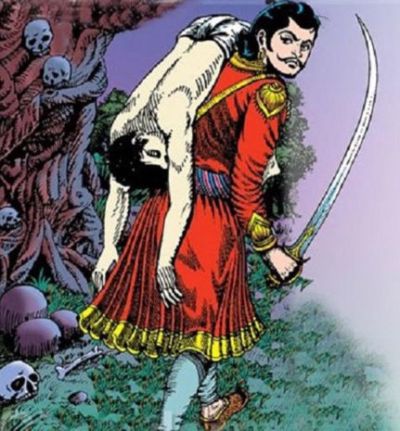“And from that day, Vāsuki sends a snake to this shore every single day, and Garuḍa eats them. This heap of bones are of those very snakes who have been devoured by Garuḍa, and have accumulated over the course of time, and now resemble a small mountain…”

इति मित्रावसोर् वक्त्रात् सान्तर्दुःखो निशम्य सः ।
निजगाद दयाधैर्यनिधिर् जीमूतवाहनः ॥ १२,२३.१०६ ॥
शोच्यः स वासुकी राजा यः स्वहस्तेन विद्विषे ।
उपहारीकरोति स्वाः प्रजाः क्लीबो दिने दिने ॥ १२,२३.१०७ ॥
धृताननसहस्रः सन्न् एकेनाप्य् आननेन सः ।
माम् आदौ भुङ्क्ष्व तार्क्ष्येति भाषितुं नाशकत् कथम् ॥ १२,२३.१०८ ॥
कथं चाभ्यर्थयामास निःसत्त्वः स्वकुलक्षयम् ।
तार्क्ष्यं नागाङ्गनाक्रन्दनित्याकर्णननिर्घृणः ॥ १२,२३.१०९ ॥
तार्क्ष्यो ऽपि काश्यपिर् वीरः कृष्णाधिष्ठानपावनः ।
ईदृशं कुरुते पापम् अहो मोहस्य गाढता ॥ १२,२३.११० ॥
इत्य् उक्त्वा स महासत्त्वो हृदि चक्रे मनोरथम् ।
अप्य् असारेण देहेन सारम् अत्राप्नुयाम् अहम् ॥ १२,२३.१११ ॥
एकस्याप्य् अद्य नागस्य कुर्यां जीवितरक्षणम् ।
अबान्धवस्य भीतस्य दत्त्वात्मानं गरुत्मते ॥ १२,२३.११२ ॥
इति संचिन्तयत्य् एव तस्मिञ् जीमूतवाहने ।
मित्रावसोः पितुः पार्श्वात् क्षत्ताह्वानार्थम् आययौ ॥ १२,२३.११३ ॥
व्रज त्वम् अहम् एष्यामि पश्चाद् इति ततश् च तम् ।
मित्रावसुं स जीमूतवाहनो व्यसृजद् गृहम् ॥ १२,२३.११४ ॥
When Jīmūtavāhana, that embodiment of courage and compassion, heard this story from Mitrāvasu, he grieved inside, and said…
“I feel ashamed of King Vāsuki, who, like a coward, offers his subjects to the enemy every day. He has a thousand faces and a thousand mouths, but what is the use?”
“For even with one mouth he could not ask Garuḍa to eat him first!”
“How could he be so cowardly, as to allow Garuḍa to destroy his entire race, and how could he be so stone-hearted as to not heed to the plight of the Nāga women?”
“And Garuḍa is the son of Rishi Kaśyapa, and the mount of Sri Kṛṣṇa! How could he be so evil? Oh, how deep is delusion!”
Jīmūtavāhana then thought to himself…
“This body of mine has no real substance in this world. May I be fortunate enough to save the life of at least one Nāga, by offering myself to Garuḍa…”
While he was lost in thought, a messenger arrived there.
Mitrāvasu’s father had asked them to come back home, and so Jīmūtavāhana sent Mitrāvasu ahead, and said that he would follow him in a while.
गते तस्मिन् स चात्रैको वाञ्छितार्थोन्मुखो भ्रमन् ।
कृपालुर् अशृनोद् दूरात् करुणं रुदितध्वनिम् ॥ १२,२३.११५ ॥
गत्वा ददर्श चोत्तुङ्गशिलातलसमीपगम् ।
युवानम् एकं पुरुषं दुःखितं सुन्दराकृतिम् ॥ १२,२३.११६ ॥
पुंसा राजभटेनेव त्यक्तम् आनीय तत् क्षणम् ।
निवर्तयन्तं रुदतीं वृद्धां सानुनयं स्त्रियम् ॥ १२,२३.११७ ॥
को ऽयं स्याद् इति यावच् च जिज्ञासुः सो ऽत्र तिष्ठति ।
करुणाकुलितश् छन्नः शृण्वञ् जीमूतवाहनः ॥ १२,२३.११८ ॥
तावत् सा तत्र वृद्धा स्त्री दुःखभारातिपीडिता ।
प्रावर्तत युवानं तं दृष्ट्वा दृष्ट्वानुशोचितुम् ॥ १२,२३.११९ ॥
After Mitrāvasu had gone ahead, Jīmūtavāhana began to walk around slowly, intent to find the Nāga who would be presented for sacrifice that day.
Suddenly, in the distance, he head the sound of someone weeping.
He walked on, following the sound, when he saw, a little far away from where he was, a young and handsome man seated on a rock, seemingly plunged in grief.
It seemed that some soldiers had brought him there, and just left. An old woman, who had followed them, stayed on, fallen at his feet, holding his leg and weeping.
Jīmūtavāhana walked towards another rock closer to where they were, and hid behind it. He was curious to know what the matter was, and he felt intense grief as the old lady kept crying loudly.
Through the streams of her tears, she said…
to be continued…
